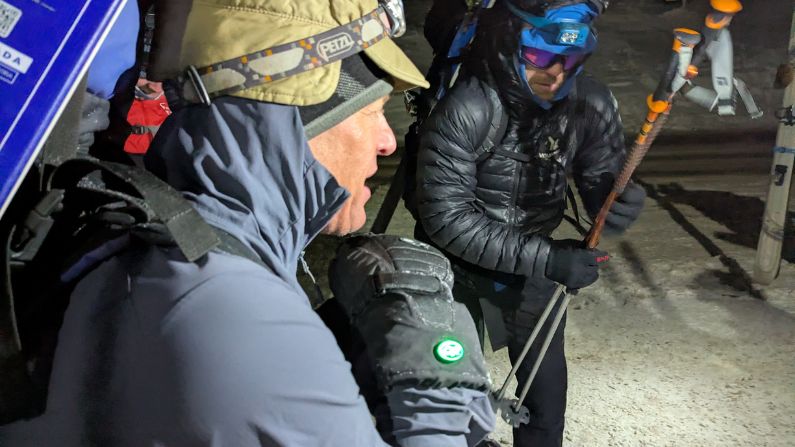It’s 15 degrees on top of Teton Pass near the Wyoming-Idaho state line and a small group of skiers prepare to hike 1,600 feet in the dark.
Christian Beckwith is the organizer of the commemorative hike, now in its second year.
“Our collective memory has faded, but they were fighting against a form of fascism that would very much have changed the world as we know it today,” said Beckwith.
Beckwith — an avid climber and alpinist — wore a 90-pound backpack filled with water to replicate the soldiers’ experience of lugging heavy gear and arms.
Trevor Thompson drove four and a half hours from Salt Lake City to Wyoming. He’s a former Navy Seal. He dressed for the occasion — not in Goretex or a puffy jacket, but in “a whole lot of wool.”
“I love skiing and I like doing hard shit,” Thompson said.
Ten skiers participated in the Glory climb.
The 80th anniversary of the February advance of Allied forces comes at a time when, under President Trump, U.S. military alliances appear to be shifting away from post-war NATO priorities. Beckwith says this year he is especially focused on remembering the fight against authoritarianism.
Beckwith says the hike also celebrates how the members of the 10th Mountain Division went on to build the ski industry as we know it today. Veterans became ski instructors, opened ski schools, and developed resorts like Aspen, Vail, and Mt. Bachelor.
“They started the field of avalanche science. Paul Petzel started the National Outdoor Leadership School. Ted Major started the Teton Science School. John Montane started what is now known as the Jenny Lake Rangers,” Beckwith said .
Outdoor recreation now contributes more than $450 billion to the U.S. GDP, according to the U.S. Bureau of Economic Analysis — an effect especially pronounced in the West. The industry represents 2% of the U.S. economy and accounts for some 4.5 million jobs.
But instead of trekking up one of the area’s three ski resorts, Beckwith says the Mt. Glory summit carries more significance. The mountaineers’ ‘climb to glory’ is almost the same vertical feet and angle as the River Bridge in Italy’s Apennine mountains lines, between 20 and 40 degrees.
“This is a pretty damn good replica of what they were up against,” said Beckwith.
The same day, on the actual Riva Ridge in Italy, current members of the U.S. Army’s 173rd Airborne Brigade Combat Team made the commemorative march — as did about a dozen other groups in Colorado, New York, Vermont, Washington, Michigan, Ohio, New Hampshire, and Idaho.






